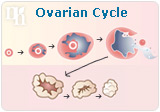
Polycystic ovary syndrome (PCOS) is a common condition among women in the reproductive age who suffer from an overproduction of androgens, mainly testosterone, and a shortage of progesterone. Between 5% and 10% of menstruating women have PCOS and have many physically recognizable signs, including:
- Hirsutism, or excessive hair growth on females that is generally associated with males
- Thinning or loss of hair on head
- Acne
- Cysts on the ovaries
- Fertility problems
- Excessive weight gain
Progesterone plays a vital role in the regulation of many of your body's processes. The production of estrogen is balanced by the production of a relational amount of progesterone. If there is an unchecked amount of estrogen in the body, a woman may suffer from estrogen dominance and may cause an overproduction of testosterone which disrupts the menstrual cycle. Though the direct cause of PCOS has not been determined, there are many characteristics of this complication as well as available treatments.
Progesterone Deficiency and PCOS
As PCOS is more of an amalgamation of symptoms characterizing one syndrome rather than a disease with one specific cause, the deficiency of progesterone in the body is only one of many possible sources of PCOS. Progesterone has a profound effect on the menstrual cycle and its irregularity is a major cause of PCOS. The following information describes how progesterone is linked to PCOS.
- If oligomenorrhea, or infrequent periods, or amenorrhea, the absence of a period, have occurred, a woman has not produced an ovum and ovulation has not occurred.
- Only after ovulation will the corpus luteum begin to produce progesterone. If a woman is suffering from anovulation, or the absence of the production of an ovum, the corpus luteum will not produce progesterone.

- The result of the absence of the production of progesterone after ovulation is the overproduction of luteinizing hormone (LH) which stimulates the production of testosterone or other androgens in the ovaries. Too much testosterone will perpetuate anovulation which begins the whole irregular cycle pattern all over again.
Progesterone Boosting Treatments
If your doctor diagnoses your PCOS a result of a progesterone imbalance, a progesterone supplement may be taken to maintain blood sugar stability and regulate androgen production. Progesterone can be purchased in cream form to be rubbed on the skin or taken orally as a pill.
Recommendation
If PCOS is left untreated, it can lead to more serious conditions like infertility, heart disease, and hypertension. Talk to your doctor to find out the treatments available to suit your lifestyle.